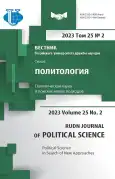«Культура отмены» в отношении России и способы борьбы с ней
- Авторы: Рустамова Л.Р.1,2, Иванова Д.Г.1
-
Учреждения:
- Московский государственный институт международных отношений МИД России
- Дипломатическая академия МИД России
- Выпуск: Том 25, № 2 (2023): Политическая наука в поисках новых подходов
- Страницы: 434-444
- Раздел: СОЦИОКУЛЬТУРНЫЕ ОСНОВАНИЯ ПОЛИТИКИ
- URL: https://journal-vniispk.ru/2313-1438/article/view/322235
- DOI: https://doi.org/10.22363/2313-1438-2023-25-2-434-444
- EDN: https://elibrary.ru/PNFYRX
- ID: 322235
Цитировать
Аннотация
«Культура отмены» зародилась в западном обществе и изначально трактовалась как социальное явление, однако со временем стала приобретать все большее политическое измерение. Ее основной платформой распространения стали социальные сети, где благодаря моментальному реагированию со стороны общества на информационный вброс «культура отмены» приобрела поистине глобальные масштабы и с 2022 г. впервые затронула целое государство. «Культура отмены» представляет собой инструмент управления социально-политическими явлениями, который можно использовать во внешнеполитических целях. Авторы предлагают вариант концептуализации и операционализации этого термина, ранее бытовавшего в общественно-публицистическом дискурсе, а также ставят перед собой задачу рассмотреть каналы распространения «культуры отмены» и предложить механизмы борьбы с ее негативными проявлениями в отношении России.
Об авторах
Лейли Рустамовна Рустамова
Московский государственный институт международных отношений МИД России; Дипломатическая академия МИД России
Автор, ответственный за переписку.
Email: leili-rustamova@yandex.ru
ORCID iD: 0000-0001-9803-9904
кандидат политических наук, доцент кафедры мировых политических процессов, МГИМО МИД России; старший научный сотрудник Дипломатической академии МИД России
Москва, Российская ФедерацияДарья Геннадьевна Иванова
Московский государственный институт международных отношений МИД России
Email: ivanovadashamgimo@mail.ru
ORCID iD: 0009-0006-0082-3711
студент магистратуры
Москва, Российская ФедерацияСписок литературы
- Bouvier, G., & Machin, D. (2021). What gets lost in Twitter “cancel culture” hashtags? Calling out racists reveals some limitations of social justice campaigns. Discourse & Society, № 32 (3), 307–327. https://doi.org/10.1177/0957926520977215.
- Clark, M. (2020). DRAG THEM: A brief etymology of so-called “cancel culture”. Communication and the Public, № 5 (3–4), 88–92. https://doi.org/10.1177/2057047320961562.
- Cook, C.L., Patel, A., Guisihan, M. et al. (2021). Whose agenda is it anyway: an exploration of cancel and political affiliation in the United States. SN Social Sciences, (1), 237. https://doi.org/10.1007/s43545-021-00241-3.
- Geusens, F., Ouvrein, G., & Remen, S. (2023). #Cancelled: A qualitative content analysis of cancel culture in the YouTube beauty community. The Social Science Journal. https://doi.org/10.1080/03623319.2023.2175150
- Habermas, J. (1962). The structural transformation of the public sphere: An inquiry into a category of bourgeois society. Herman Lutcherhand Verlag, Darmstad and Neuwid, Federal Republic of Germany. 328 p.
- Lorde, A. (1984). Uses of anger: Women responding to racism. Crossing. (Ed.), Sister outsider: Essays & speeches, 124–133.
- Mueller, Th.S. (2021). Blame, then shame? Psychological predictors in cancel culture behavior. The Social Science Journal, 1–14. https://doi.org/10.1080/03623319.2021.1949552
- Noelle-Neumann, E. (1974). The Spiral of Silence: A Theory of Public Opinion. Journal of Communication, (24), 43–51. https://doi.org/10.1111/j.1460-2466.1974.tb00367.x.
- Norris, P. (2020). Closed Minds? Is a “Cancel Culture” Stifling Academic Freedom and Intellectual Debate in Political Science? HKS Faculty Research Working Paper, Series RWP20-025, 5 August. 29 p.
- Pilon, J.G. (2020). America and the Cancel Culture of Fools. Israel Journal of Foreign Affairs, 1–14. https://doi.org/10.1080/23739770.2020.1815365.
- Saldanha, N., Mulye, R., & Rahman, K. (2022). Cancel culture and the consumer: A strategic marketing perspective. Journal of Strategic Marketing. https://doi.org/10.1080/0965254X.2022.2040577.
- Velasco, J.Ch. (2020). You are Cancelled: Virtual Collective Consciousness and the Emergence of Cancel Culture as Ideological Purging. Rupkatha Journal on Interdisciplinary Studies in Humanities. Special Conference Issue, 12(5), 1–7. https://doi.org/10.21659/rupkatha.v12n5. rioc1s21n2.
- Walker Ch., & Ludwig, J. (2017). The Meaning of Sharp Power. How Authoritarian States Project Influence. Foreign Affairs, 2017, November 16. Retrieved March 16, 2023, from https://www.foreignaffairs.com/articles/china/2017-11-16/meaning-sharp-power
- Whipple, K. (2023). Contextualizing the Art and the Artist: How U.S. Arts and Culture Journalists Perceive the Impact of Cancel Culture Practices and Discourses. Journalism Practice. https://doi.org/10.1080/17512786.2023.2180653
Дополнительные файлы









